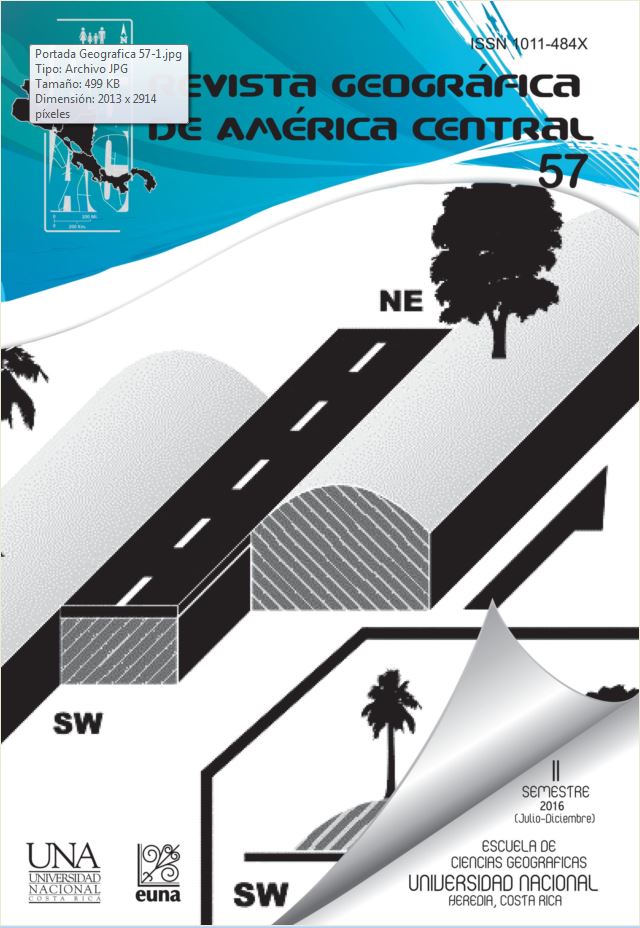GENERATION RATES AND CHARACTERIZATION OF ORDINARY SOLID WASTE IN FOUR MUNICIPALITIES OF THE METROPOLITAN AREA COSTA RICA
DOI:
https://doi.org/10.15359/rgac.57-2.9Keywords:
Urban solid waste, generation rates, metropolitan areaAbstract
Generation rates and the characterization of ordinary solid waste were determined in the residential and commercial sectors of four municipalities in the Metropolitan Area of Costa Rica. For this, a sampling was performed on a representative number of homes and businesses in the 2014-2015 period during seven days. The waste generation weighted average rate in the work area turned out to be 0.59 kg / inhabitants.-day. Solid waste generated presented as major components: organic 55.9%, followed by materials with high potential to be recycled or used as fuel (10.2% plastic, paper and cardboard 10.4%). The average moisture content in the waste was 58.7 mass% (minimum 54% in Alajuela and maximum 63% in Barva), of which up to 67% may be attributable to biodegradable organic waste. The average waste volumetric weight was 155 kg / m3 (minimum of 141 in Belen and maximum of 163 in San Jose). Significant differences appear in the composition of commercial and residential waste, mainly regarding organic waste, paper, cardboard, and plastic.
References
Castillo, A. (2013). Propuesta conceptual del aprovechamiento de los
residuos sólidos orgánicos municipales generados en el estado de
Morelos mediante la tecnología de digestión (tesis de licenciatura).
Universidad Nacional Autónoma de México, México.
Colomer, F. y Gallardo, A. (2013). Tratamiento y gestión de residuos sólidos. España: Universidad Politécnica de Valencia. (pág 35-38).
Hoornweg, D. y Bhada-Tata, P. (2012). What a Waste: A Global Review of Solid Waste Management. Washington, D.C.: World Bank.
Jaramillo, J. (2002). Guía para el diseño, construcción y operación de rellenos sanitarios manuales. Perú: Centro Panamericano de Ingeniería Sanitaria y Ciencias del Ambiente
La Gaceta. (29 de Junio de 2016). La Gaceta. Recuperado de http://www.gaceta.go.cr/pub/2010/07/13/COMP_13_07_2010.html
López-Acosta, A. (1999). Manual para muestreos de Residuos Sólidos.
Memoria profesional. Escuela Superior de Ingeniería y Arquitectura,
Instituto Politécnico Nacional, México.
Lund, H. y Muenster, M. (2010). Comparing Waste-to-Energy technologies by applying energy system analysis. Waste Management, 30, 1251-1263.
Programa Competitividad y Medio Ambiente (CYMA). (2007). Plan de
Residuos Sólidos Costa Rica (PRESOL): Diagnóstico. s/e. San José,
Costa Rica.
Programa Competitividad y Medio Ambiente (CYMA). (2012). Guía metodológica para la realización de estudios de caracterización de residuos. San José, Costa Rica.
SEMARNAT. (2006). Diagnostico Básico para la Gestión Integral de
Residuos. México: Secretaria de Medio Ambiente y Recursos
Naturales.
Tchobanoglous, G., Theisen, H. y Vigil, S. (1994). Gestión integral de
residuos sólidos. New York: McGraw-Hill.
Vértice, P. (2008). Gestión medioambiental: manipulación de residuos y productos químicos. Colombia: Publicaciones Vértice.
Downloads
Published
How to Cite
Issue
Section
License
Proposed policy for journals offering Open Access
Authors publishing their works in the Journal acknowledge and agree to the following terms:
a) Authors retain the copyrights to their works and guarantee the Journal the right to be the first to publish their works, under the Creative Commons License Attribution-NonCommercial-ShareAlike 4.0 International, CC BY-NC-SA 4.0 International (https://creativecommons.org/licenses/by-nc-sa/4.0/deed.es), which allows others to share works upon complying with the acknowledgment of authorship and mention of the Journal as the original publisher of the work.
b) Authors are permitted to separately establish additional agreements for the non-exclusive distribution of the official edition of the work published in the Journal (for example, authors may desire to place the work in an institutional repository or incorporate it into a book that is to published elsewhere) so long they acknowledgment to recognize the Journal as the original publisher. The aforementioned additional agreements must respect the terms of the non-profit character and sharing philosophy of the original license (CC BY-NC-SA 4.0 International, https://creativecommons.org/licenses/by-nc-sa/4.0/deed.es).
c) Authors are encouraged to archive the post-print or editor/PDF version in Open Access repositories.






 REVGEO is licensed under https://creativecommons.org/licenses/by-nc-sa/4.0/deed.es
REVGEO is licensed under https://creativecommons.org/licenses/by-nc-sa/4.0/deed.es
.svg_4.png)

_(1).png)
_(1)_(1)_(1)_1.png)
(2)(1)(1)(1).png)
